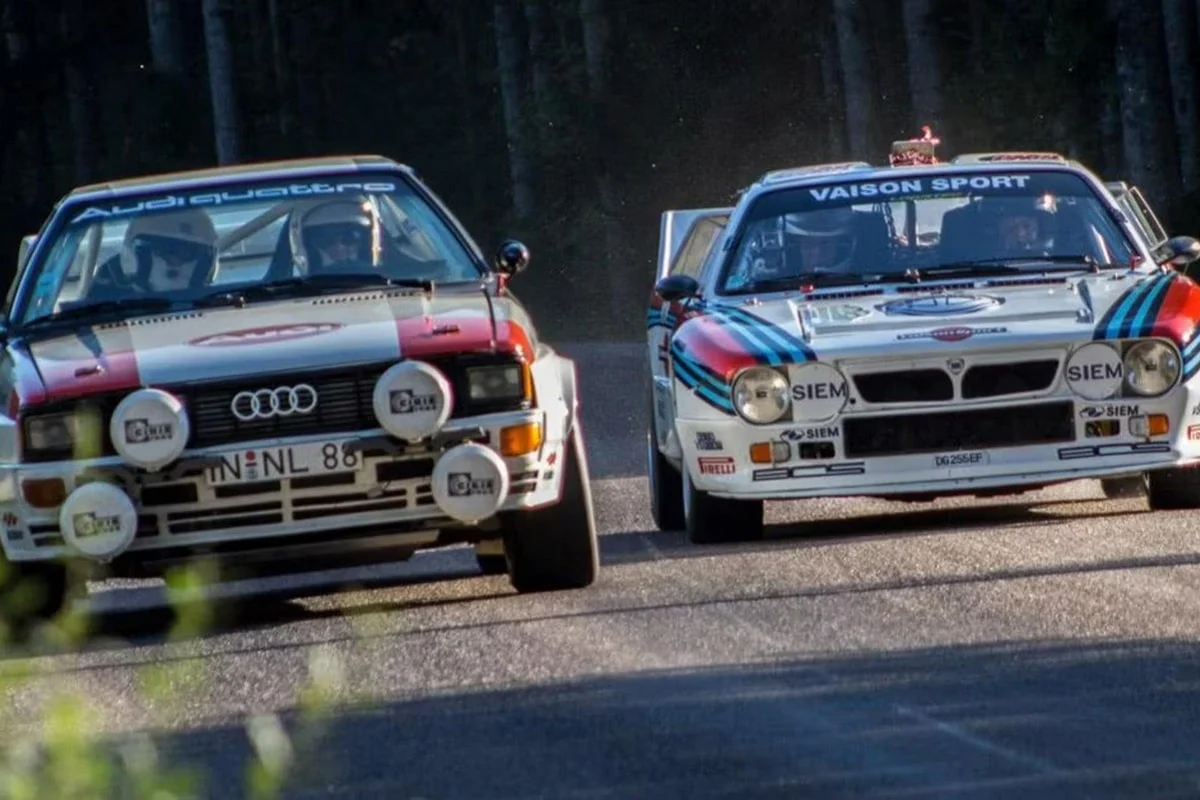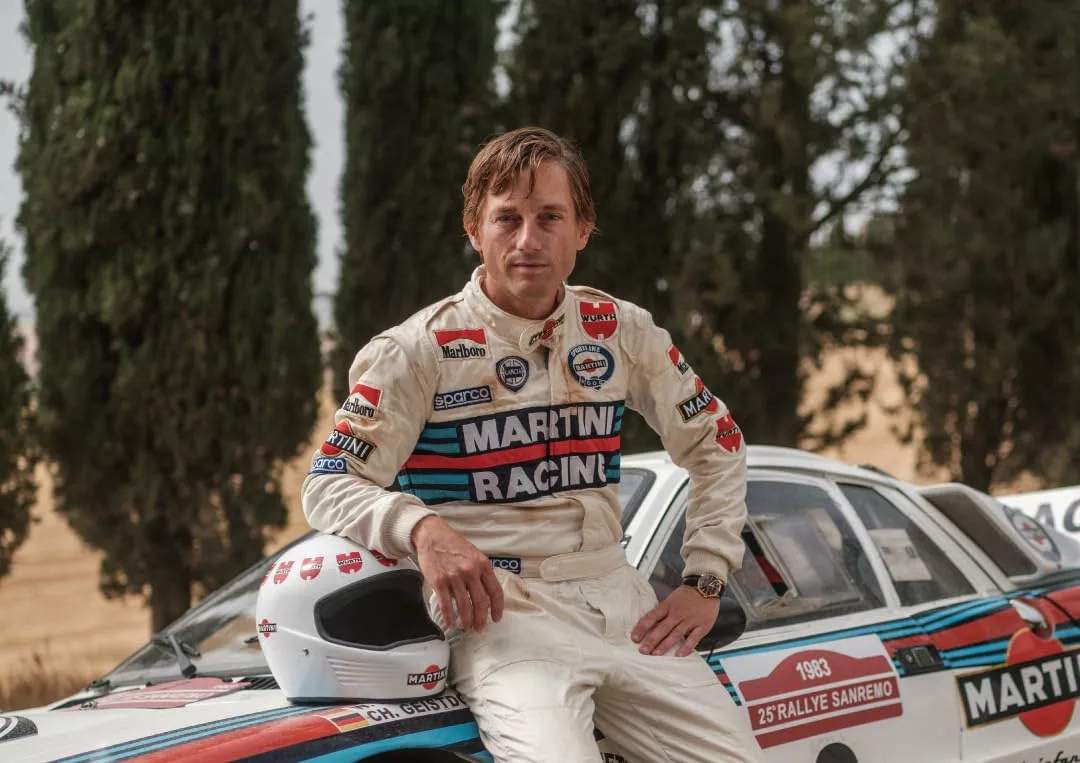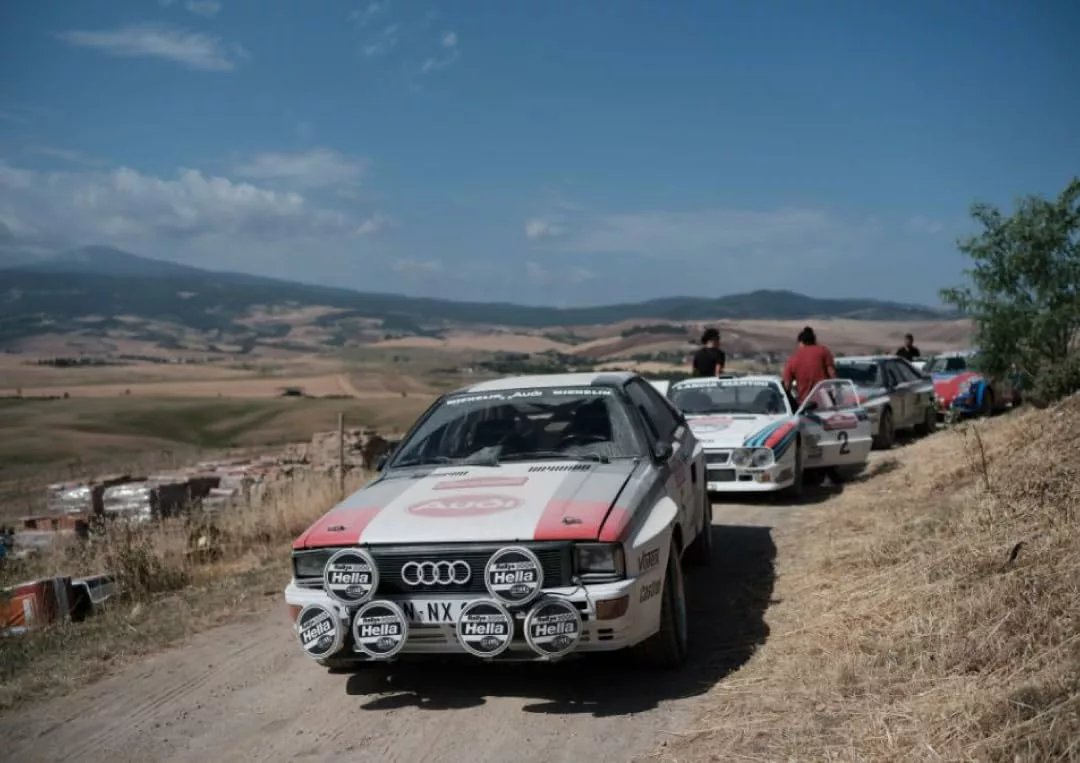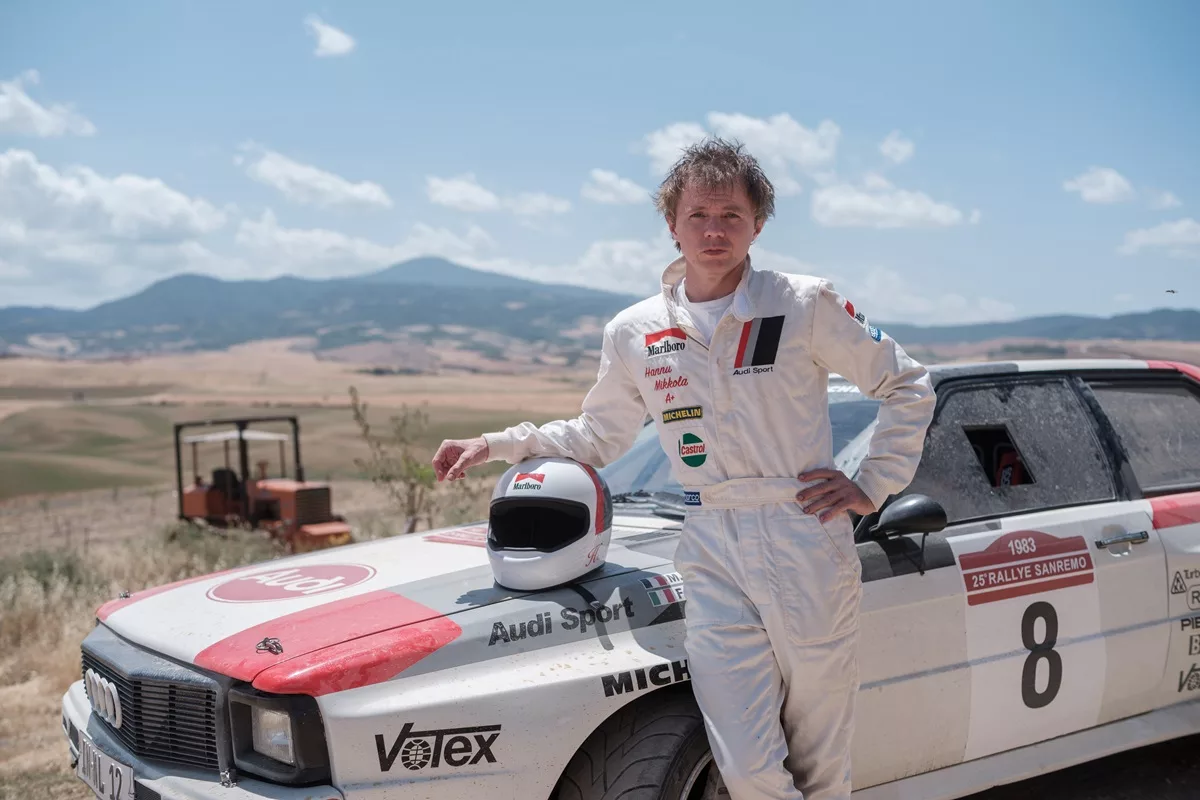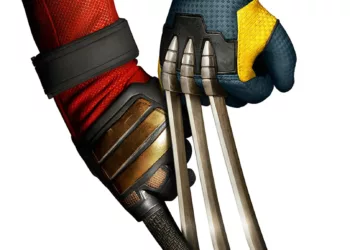Before dominating Formula 1 in the 2000s, Scuderia Ferrari built its racing pedigree competing in rally during the 60s, 70s and 80s. One of the most epic head-to-head battles took place in the 1983 World Rally Championship between Italian manufacturer Lancia and their German rivals from Audi. Though not a beat-for-beat historical retelling, the film Race for Glory: Audi vs. Lancia brings this dramatic underdog story to life in live-action for the first time.
Led by actor Riccardo Scamarcio’s intense portrayal of real-life Lancia team manager Cesare Fiorio, the movie captures the ruthless drive and never-say-die spirit that pushed the squad to overcome seemingly impossible odds. With Audi’s advanced four-wheel-drive technology giving them an edge, Lancia had to get creative, using some questionable tactics to even the playing field. Against his wishes, Fiorio manages to coax legendary driver Walter Röhrl out of retirement to take the wheel of Lancia’s 037. The interplay between Scamarcio and Röhrl, played by Volker Bruch, gives viewers an inside look at the internal clashes behind the scenes.
While it takes some creative license, Race for Glory succeeds at dramatizing the white-knuckle action and garage politics that characterized the unforgettable 1983 championship. Strap in for a no-holds-barred view of two automakers pushing technology and talent to the absolute limit.
Scene Stealers: Rally Icons Come to Life
Riccardo Scamarcio leads the pack with his gripping take on Cesare Fiorio, the uncompromising team principal determined to lead underfunded Lancia to glory. Scamarcio’s intense stare and gift for rattling off razor-sharp Italian dialogue makes you believe he’d run over his own grandmother if it gained a few extra horsepower. This is a man obsessed, and Scamarcio nails it.
As Fiorio’s corporate rival Roland Gumpert, Daniel Brühl revisits similar terrain to his acclaimed turn as Niki Lauda in Rush. Brühl excels at portraying the cold strategic thinking underlying German engineering might. Gumpert begins the season smugly assured in Audi’s superior technology, only to watch in horror as Fiorio continually finds ways to neutralize their advantage.
The casting coup comes in landing Volker Bruch as Walter Röhrl, the temperamental German driving legend Fiorio desperately woos out of retirement. Bruch captures Röhrl’s aloof genius, a man who seems irritated at having to keep proving himself as the greatest driver alive. Late in the season, Fiorio leans heavily on Röhrl’s supreme car control to pull off a string of miracle wins. Their tense relationship generates serious fireworks.
Rounding out the talent is Katie Clarkson-Hill as Jane McCoy, the team nutritionist who wrangles Fiorio’s unruly driving squad. Her no-nonsense approach masks a personal connection to past rally tragedies. Clarkson-Hill provides a steady, compelling presence amidst all the masculine posturing.
“Get ready for a wild, blasphemous ride with our Deliver Us review. This religious thriller explores the eternal struggle between good and evil, blending shocking violence with religious iconography for a unique cinematic experience.”
Pedal to the Metal: High-Speed Rivalry Hits the Dirt
The 1983 World Rally Championship makes for the ultimate David vs Goliath showdown. Audi enters the season flush with funding and technology, their revolutionary all-wheel-drive Quattro cars dominating rallies the previous year. Italian rival Lancia languishes as serious underdogs, struggling to keep pace with their German nemesis.
Desperate for a winning edge, Lancia manager Cesare Fiorio coaxes legendary driver Walter Röhrl out of comfortable retirement to pilot their 037. Though lacking Audi’s traction advantage, the 037 boasts nimble handling thanks to its rear-wheel drive layout. Fiorio wagers that Röhrl’s genius touch behind the wheel can exploit any weakness in the Quattro’s armor.
The season opens in Monte Carlo, with snowy conditions expected to favor the Quattro. Ever the schemer, Fiorio pulls off a stunning ploy by coating parts of the course with melted snow, allowing Lancia to grab an unexpected win on specialized tires. From then on, it’s no holds barred between the bitter rivals.
We watch Fiorio and Röhrl clash over risky strategy calls that push man and machine to the very brink. Audi strikes back on the grueling Safari Rally in Kenya, but Lancia answers by monopolizing the podium in Corsica. The championship remains up for grabs entering the final two rallies.
In a thrilling and controversial finale, Lancia capitalizes on curious rulings over the Quattro’s all-wheel drive system to clinch two straight seconds behind Röhrl. Despite Audi winning the most events, Lancia does just enough to grab their first manufacturer’s title in over five years. The scrappy Italian squad beats the mighty Germans at their own game.
Race for Glory squeezes loads of high-octane drama from this unlikely tale of underdog triumph. Just like the thin margin between victory and violent catastrophe central to rally racing, Fiorio walks ethical lines in pursuit of glory, risking life and legend along the way.
Throttling Toward Greatness
At the core of Race for Glory’s appeal lies Riccardo Scamarcio’s stellar portrayal of Lancia’s do-whatever-it-takes team boss Cesare Fiorio. Riveting and unnerving in equal measure, Scamarcio mesmerizes as he barks orders in rapid-fire Italian, gesticulating wildly like an orchestra conductor trapped in a tornado. This Fiorio lives perpetually on the knife edge separating genius from madness as he schemes to conquer the dominant Audis. Scamarcio gives a masterclass in portraying obsession that makes the character impossible to look away from.
Another strong suit comes via capturing the “life on the limit” essence of high-stakes rally driving. Viewers feel the danger lurking around each hairpin turn thanks to tight camera angles and shaking closeups from inside the cockpit. While not reaching the visual virtuosity of Ford v Ferrari, the racing sequences generate plenty of edge-of-your-seat thrills.
We get a vivid sense of the superhuman car control and insane risk-taking separating podium finishers from crumpled wreckage. The film also embraces rallying’s unpredictable nature, throwing in enough muddy mishaps and snow bank crashes to satisfy adrenaline junkies.
At its core lies an immensely compelling real-life Cinderella story. Watching scrappy Lancia slay the mighty, supremely-funded Audi Goliath with guts and gamesmanship makes for a gratifying narrative. Director Stefano Mordini deserves recognition for avoiding sports movie cliches, like shoehorning in some contrived romance for Fiorio. Mordini keeps the focus tight on characters that enrich themes of obsession and ethical compromise in dogged pursuit of victory.
“Get ready for a wild and raucous road trip with our Drive-Away Dolls review. Dive into the delightful debauchery and high-octane performances that make this journey unforgettable.”
Stalling Short of the Podium
For all of Race for Glory’s high points, the film suffers from an uneven focus resulting in missed opportunities. In his effort to showcase Fiorio’s maniacal pursuit of victory, director Stefano Mordini leaves several compelling characters underbaked. We get intriguing glimpses into the enigmatic genius of Röhrl, but too often he drifts into the background. The same goes for Audi’s team boss Roland Gumpert, played with icy rigidity by Daniel Brühl. Both men represent foils that could have further illuminated Fiorio’s obsessive perfectionism.
The plot also drags through episodes overloaded with gearhead jargon about chassis settings and engine tweaks. While true auto buffs might enjoy all the shop talk, it bogs down the drama for viewers lacking engineering degrees. Moments of levity or character development would have helped relieve the monotonous stretches.
Likewise, the actual racing covers familiar ground, lacking the white-knuckle innovation of classics like Le Mans ‘66. The nighttime snow-covered Monte Carlo opener captivates, but later rallies blend together, relying more on crashes than artistry to generate excitement. We expect virtuoso directing in racing films, and Mordini’s workmanlike sequences can’t match the visual mastery of his source material.
In the end, Scamarcio’s acting bravura puts the plot on his shoulders perhaps more than it can bear. When he’s not front and center, you feel the absence of his fiery dynamism. Uneven pacing and looping rallies make the slim 102 minute run-time feel longer, pointing to the pitfalls of leaning too hard on a single character.
Checkered Morality
At its core, Race for Glory examines the ethical lines people will blur to achieve supremacy in ultra-competitive pursuits. Fiorio constantly flirts with cheating, manipulating decisions and conditions to counter Audi’s performance advantages. We witness the corrosive effects of win-at-all-costs obsession, with the accord between Fiorio and Röhrl fraying despite shared history and nationality.
The film also speaks to perseverance allowing underfunded long shots to topple corporate titans. Watching Lancia maximize meager resources while their German rivals enjoy an open budget tap into universal sympathies. The scrappy squad uses clever gambits to offset Audi’s mighty engineering might, letting us celebrate an against-all-odds outcome.
Finally, the movie underscores innovation as the lifeblood of automotive competition. We relive Audi’s game-changing Quattro introducing all-wheel drive technology to rally racing. Lancia answers with improvements allowing their rear-drive 037 to still challenge. The never-ending quest for performance pushes teams to adopt new designs altering the course of events. In racing, standing still means getting passed by hungry competitors pushing boundaries ever-further.
Serviceable Style, Signature Soundtrack
While not groundbreaking, director of photography Luigi Martinucci delivers solid visual storytelling. The racing scenes feature expected cockpit and bumper cam angles along with judicious slo-mo key crashes. Martinucci frames interior garage debates through slow pushes and pulls, keeping a red-faced Fiorio prominent while hinting at tensions with Röhrl. The cinematography fulfills its role enhancing drama without showboating.
However, composer Andres Venerus makes a stronger impression with his pulsing electronic score. Throbbing synth tones echo racing heartbeats, with cyclic melodies subtly suggesting the repetitive motion of rally stages. Venerus incorporates higher-pitched metallic sounds evoking revving engines and components under stress.
The music pounds with tense purpose during pivotal mechanics sessions and moments of driver doubt. Creative sampling even recreates pacenote calls embedded into arrangements. The propulsive soundtrack immerses viewers into the heat of the rally, amplifying stakes through its very texture.
While not flashy, the camerawork and music of Race for Glory bolster key contexts even if they don’t overwhelm scenes. Martinucci’s composition and Venerus’ sonic atmospheres offer driving emotion when dialogue alone can’t capture the visceral intensity.
Gas pedal to the Floor
Race for Glory: Audi vs. Lancia succeeds on the strength of Riccardo Scamarcio’s mesmerizing performance as Lancia’s win-obsessed dynamo Fiorio. He alone makes the film worth watching for racing aficionados. However, director Stefano Mordini struggles to juggle supporting characters, while rally footage blends together amidst thick technical jargon. Still, the true-life origins foster investing in the underdog emotional arc.
Hardcore gearheads will adore the in-the-pits detailing, yet casual fans may grow bored. Aside from Scamarcio’s vivid portrayal of intense tunnel vision, the familiar story beats won’t surprise savvy viewers. Uneven pacing causes the brief runtime to occasionally drag absent dynamic racing visuals.
In the end, Scamarcio’s acting potency towing the limping Lancia squad to glory mirrors Fiorio dragging his ragtag crew over the championship finish line by force of will alone. For racing history buffs, it’s not to be missed. More casual audiences should temper expectations slightly, focusing instead on the magnetic leading man shouldering unreasonable expectations. Where precision counts, Race for Glory provides podium-level performance from its top actor, if not the complete package.
The Review
Race for Glory: Audi vs. Lancia
Despite Formula 1 grabbing most of the glory, rally racing also provides high-octane thrills worth dramatizing on the big screen. While more laser-focused editing and character development could have removed some sputtering moments, Race for Glory succeeds in capturing this fascinating real-life sports rivalry. Fueled by Riccardo Scamarcio’s intensely combustible lead performance, the film wins respect for confronting the questionable extremes of obsession, even if broader audiences may get lost in the technical trenches.
PROS
- Riccardo Scamarcio gives an intense, mesmerizing performance as Lancia team manager Cesare Fiorio.
- Captures the high-stakes drama and danger of rally racing.
- The underdog narrative of Lancia overcoming Audi's advantages is compelling.
- Score and sound design help create an immersive atmosphere.
- Real-life story provides inherent drama and interest.
CONS
- Supporting characters like Walter Röhrl not fully developed.
- Technical racing jargon slows down the pacing at times.
- Familiar racing movie tropes and story beats.
- Uneven editing and loose narrative focus.
- Direction of racing scenes workmanlike compared to classics.











